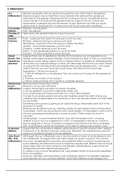Study guide
OCR Religious Studies (H173, H573): Religion and Ethics Revision Notes - 4 Utilitarianism
These revision notes for the new OCR Religious Studies A level cover the normative ethical theory proposed by Bentham – Utilitarianism. They cover act utilitarianism and its development into rule and preference utilitarianism and includes evaluation of the theories. They are detailed and are to a...
[Show more]




